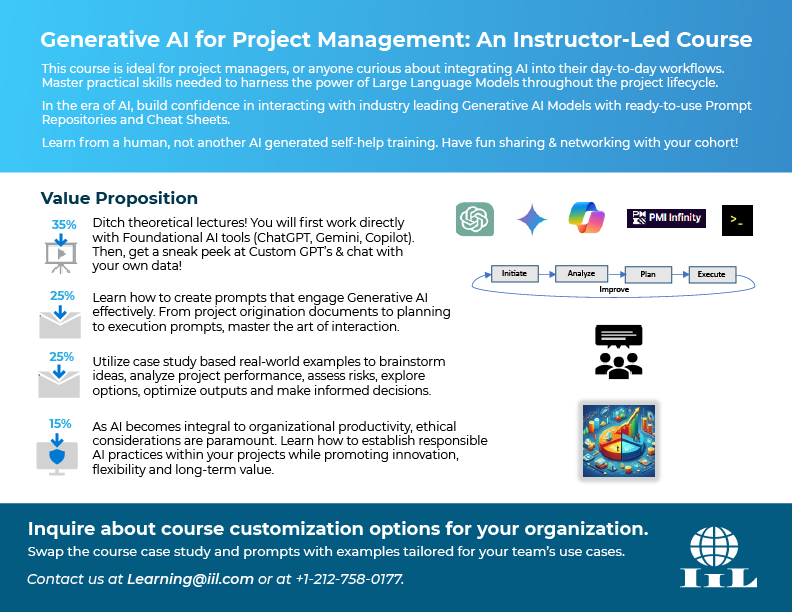Generative AI for Project Management
Stop managing projects, start owning them with IIL’s Generative AI for Project Management Course! Learn how to leverage AI technologies to boost efficiency, optimize resources, and achieve successful results.
No prior AI experience required! This non-technical course is packed with beginner-friendly, actionable insights. You will learn how to:
- Understand the fundamentals of Generative AI and its powerful applications in project management.
- Gain practical experience with diverse AI tools across various stages of your projects.
- Develop a strategic approach to integrate AI seamlessly into your workflow.
- Get hands-on experience with different AI platforms.
- Navigate ethical considerations and ensure responsible use of AI in your projects.
Investing in this course empowers you to:
- Gain a comprehensive understanding of generative AI and its applications in project management.
- Develop critical thinking skills to leverage AI effectively in your projects.
- Stay informed with up-to-date information on the latest advancements in AI.
- Demonstrate your expertise in AI-powered project management with tool-agnostic learning.
- Increase your project success rate through informed decision-making enabled by AI.
This course is ideal for:
- Project managers of all levels
- Team leaders and business professionals
- Professionals interested in exploring AI for project management without any prior technical background.
Contact our team to check if you qualify for a discount or to discuss group pricing or training a team.
You can also email us at [email protected] or submit a request below.
Reviews from IIL Learners!
“The course content was incredibly comprehensive, covering a wide range of topics from the basics to advanced concepts. The instructors were not only knowledgeable but also excellent communicators, making complex concepts easy to understand. The practical exercises and hands-on projects provided valuable real-world experience, reinforcing the theoretical knowledge gained throughout the course.”
- Colonial Training
and Consulting, LLC
“Great course, excellent Instructor, awesome content, seamless and well-organized Virtual sessions.”
- Prasad G.
“Great intro to the types of tools available and different ways to utilize and tweak them to suit your needs.”
– Edward Gonda
Senior Project Manager,
Boston Scientific
“Great course! Especially with real-life examples for Projects. The Instructor (Ruchi) was very knowledgeable. I had no info or exposure to AI tools, especially for Project management prior to this course. This course was well balanced and really helped me understand the basics of AI possibilities. Great course, wonderful instructor. The IIL team were great support for preparing for the course, attending and with follow-up. I will continue being a customer of IIL training.”
– VMWD Services, LLC
“Enjoyed the course and came away knowing much more than I did. The content felt right for my level as someone who has played around in AI and tried to use it for some aspects of work.”
- M. Delaney,
PMO Director
Frequently Asked Questions
While AI is a broad concept that refers to machines capable of performing tasks that seem intelligent, Machine Learning (ML) is a subset of AI focused on the idea that systems can learn from data, identify patterns, and make decisions with minimal human intervention. ML is the method through which we achieve many AI functions, using statistical techniques to enable machines to improve at tasks with experience.
Generative AI is a type of AI that can generate new content, whether it’s text, images, or music. It learns from a vast amount of existing material and then uses that knowledge to create original, plausible new outputs. It’s like teaching a computer to be creative based on patterns it has learned from existing works.
Currently, AI cannot "think" like humans in a comprehensive way. AI systems excel at processing large amounts of data and recognizing patterns within this data much faster than humans. However, they lack consciousness, emotions, and the ability to understand context in the way humans do. AI's decision-making is based on data and algorithms, and it does not possess the human aspects of thought, such as intuition and reasoning based on emotional intelligence.
There are mainly two types of AI: Narrow AI and General AI.
Narrow AI, also known as Weak AI, is designed for specific tasks such as voice recognition or image recognition and is the type of AI predominantly seen today (e.g., Siri, Alexa).
General AI, also known as Strong AI, refers to systems that possess the ability to perform any intellectual task that a human can do. General AI is still a theoretical concept and not yet achieved.
AI has numerous applications in daily life. Personal assistants like Siri and Alexa help in performing tasks through voice commands. Recommendation systems on platforms like Netflix or Amazon personalize user experience by suggesting products or content. Autonomous vehicles use AI to interpret sensory data to identify appropriate navigation paths. AI is also used in fraud detection, medical diagnoses, and even in smart home devices for energy efficiency.
Ethical considerations in AI include issues like privacy, bias, transparency, and job displacement. Ensuring AI systems respect user privacy and data security is vital. AI systems can also reflect or amplify biases present in their training data, so it's important to develop AI in a way that is fair and unbiased. Transparency in AI processes helps in building trust and understanding its decision-making. Moreover, as AI automates tasks, there are concerns about job displacement, highlighting the need for policies to manage economic and social impacts.
Healthcare: AI is used for diagnostic procedures, personalized medicine, and drug discovery.
Finance: AI aids in fraud detection, algorithmic trading, and personalized customer service.
Transportation: Self-driving cars and optimization of logistics and delivery services.
Retail: AI provides personalized shopping experiences and inventory management.
Entertainment: AI curates personalized content recommendations in streaming services and video games.




